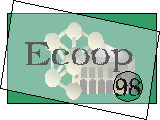
12th European Conference on Object-Oriented Programming
Brussels, Belgium, July 20 - 24, 1998
 |
12th European Conference on Object-Oriented Programming |
Workshop W9 |
| Organizers: |
Houari A. Sahraoui <hsahraou@crim.ca> Walcelio Melo <wmelo@br.oracle.com> Sandro Morasca <morasca@elet.polimi.it> |
| Contact: |
Houari A. Sahraoui <hsahraou@crim.ca>
CRIM 1801 McGill College #800 Montreal Quebec Canada H3A 2N4 Tel: (514) 840 1234, #6061 Fax: (514) 840 1244 |
| URL: | http://www.crim.ca/~hsahraou/oopm.html |
| Day: | Tuesday |
| Room: | C302 (4th floor) |
Software measures have been extensively used to help software
managers, customers, and users to assess the quality of a software
product based on its internal characteristics. Many large software
companies have intensively adopted software measures to better
understand the relationships between software quality and software
product internal attributes. In this workshop, we are mainly concerned
in investigating software products measures for Object-Oriented
software systems which can be used to assess the quality of large OO
software systems. OO paradigm provides powerful design mechanisms
which have not been fully or adequately quantified by the existing
software products measures. Work which investigate analytically or
empirically the relationship between OO design mechanisms, e.g.,
inheritance, polymorphism, encapsulation, usage etc., and different
aspects of software quality, e.g., reparability, understandability,
extensibility etc., are specially welcome. More precisely, topics
dealing with one or more of the following areas : (1) OO metrics
versus quality attributes (reliability, portability, maintainability
etc.); (2) Automatic collection (collection tools, collection OO CASE
tools); (3) Validation of OO metrics (Empirical and Formal); (4)
Relationships between OO product and process metrics; (5) Standards
for the collection, comparison and validation of metrics.
This workshop will provide a forum to discuss the current state of
the art and the practice in the field of OO product metrics. A blend
of researchers and practitioners from industry and academia will share
recent advances in the field, success or failure stories, lessons
learned, and will seek out as yet unidentified fundamental problems
arising in this field.